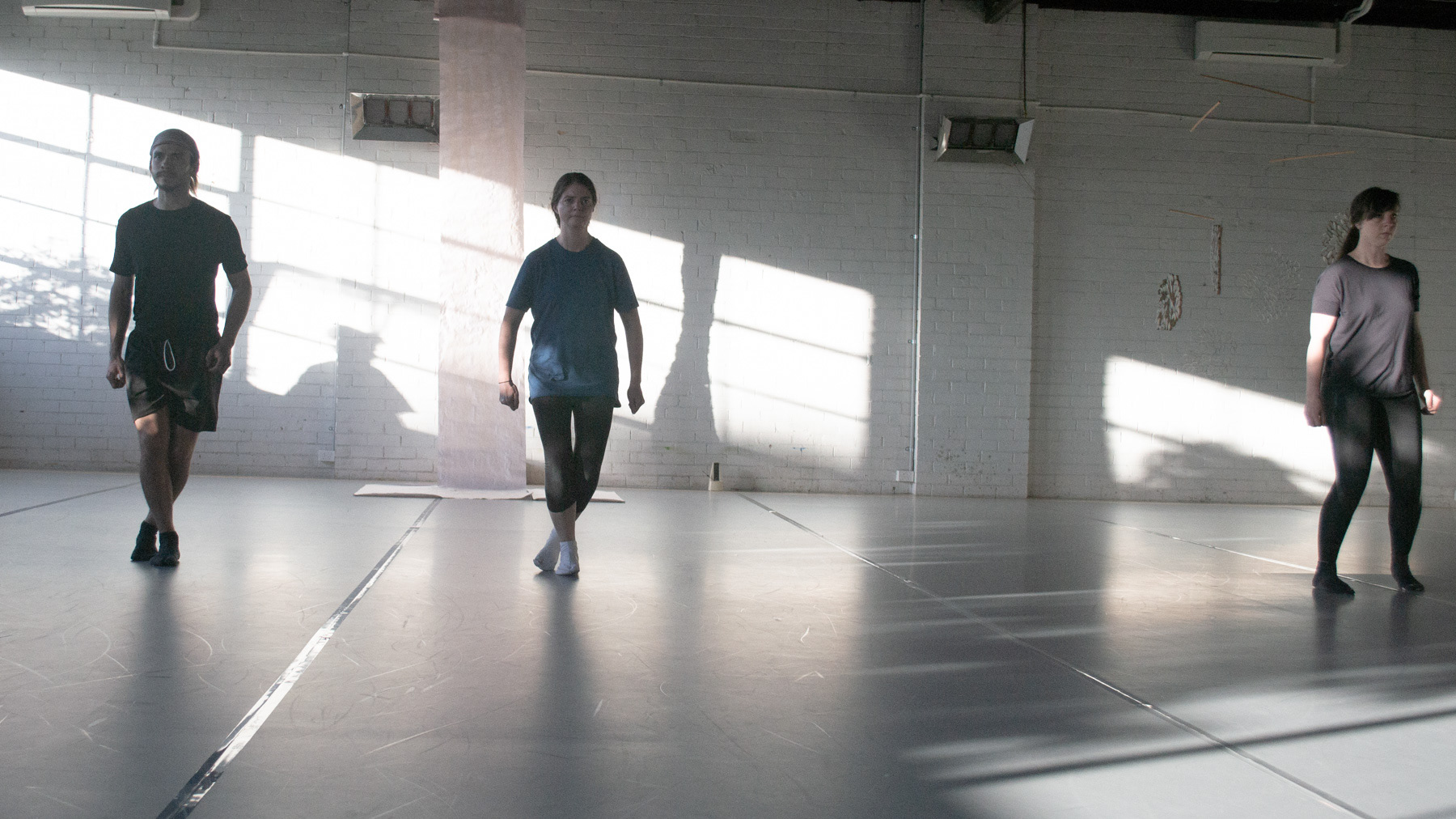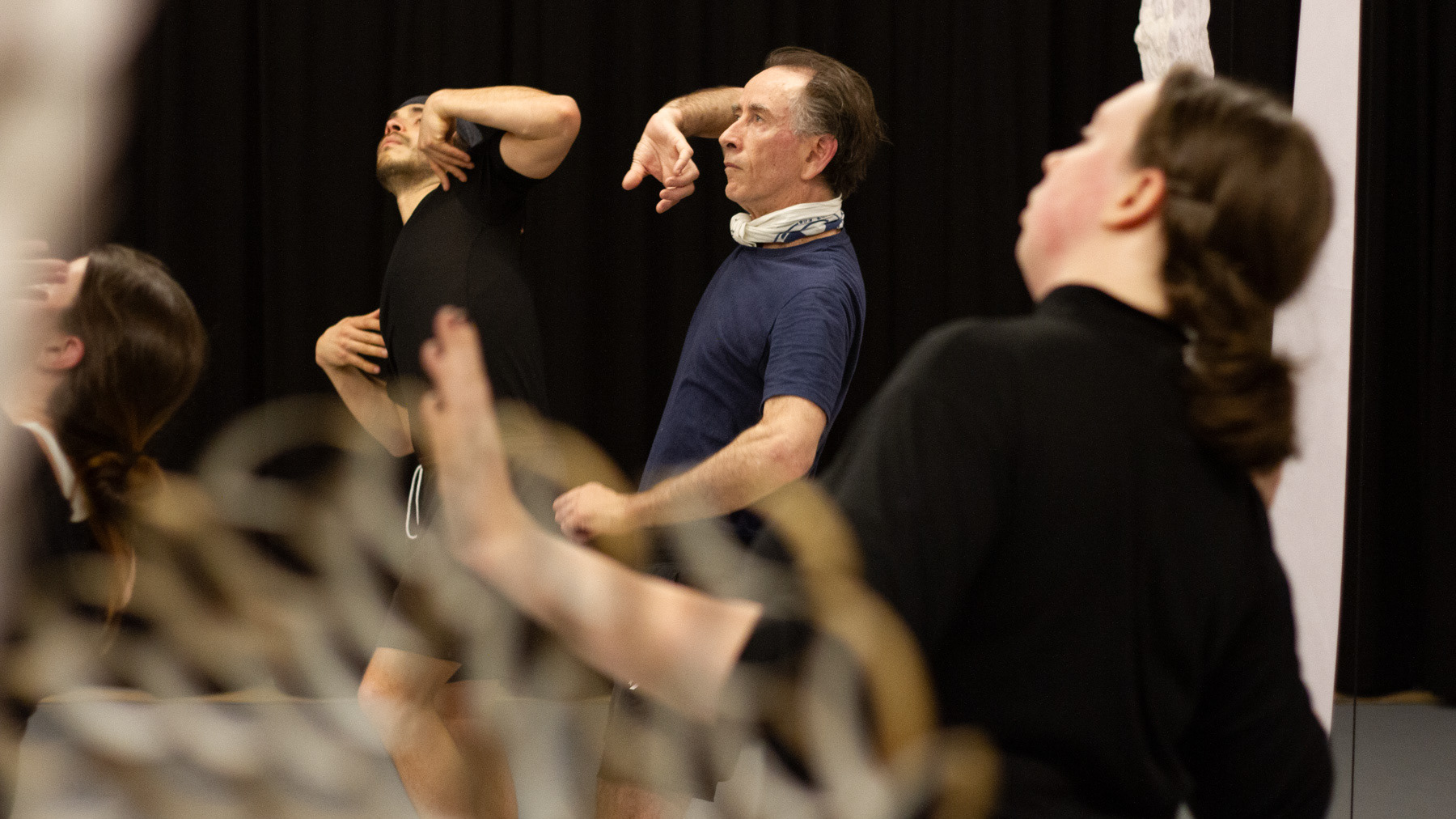Artistic Manifesto - The Thursday Group
Our theatre group is a machinic ensemble[i][1], connecting components inside boundaries of if: yes or no gates which distinguish it from other theatrical machines. The central role of all the components in our machinic ensemble is to act. that is, they are actors and reactors[2]. Their action creates energy, which makes the machine's vital flow and they too are enriched by the flow[3]. Each actor has quantifiable tools such as hands for touch and gesture, voice to express. They also have unquantifiable tools such as inspiration, emotion, meaning, memory and consciousness[ii][4]. The actors desire, therefore the machine. These tools are the machine and are used by the machine. The machinic ensemble is not a model or a metaphor, it is real. With equal unit value, all actors connect according to their desire, ability, potential and the machine's requirements. Over time, personal and collective identities complement each other[5]. So individual telos adapts to encode a culture of agencement[iii]. The machinic ensemble knows the playing field of intersubjectivity between its members; it is immanent, it is becoming[6], it celebrates difference, and it is processual[7]. At times actors become directors, luggers, producers, writers, librarians, musicians, scenographers, riggers, marketers, costumiers, editors, builders, accountants, cleaners and so on. These interdependent operations are discovered through necessity and learnt, and one of the machine's functions is this discovery and learning; another is playing[8]. It experiments, it originates, it interprets, it recycles. It understands discipline and ritual, but this does not limit its passion, iconoclasm and humour. As the machinic ensemble defines it, productions pursue excellence. The machine is part of an economy in which it sells its wares, but making not selling art is its telos. However, within its means, the machinic ensemble disburses income, and all its actors are paid according to time spent. This machine is compassionate. The ethical positions of the collaboration and the art agree. The machine treads sustainably[9] on the earth. All its actors share rigorous and ongoing reflexion[10]. When internal or external factors cause friction or inertia, the machinic ensemble enacts protocols that are agreed as appropriate. What is good for the actor is good for the machine[iv]; if an actor arrives, rests or leaves, with patience and good will, the machine adapts because it is continually producing, moving and evolving. This evolution makes wellbeing in the actors and resilience in the machinic ensemble. The machinic ensemble knows its influences and passes on its knowledge to other machines. Eventually, the machine breaks, and the actors encode new machines.
**********
[1] Laura Cull, ‘Introduction’, in Theatres of Immanence. [Electronic Resource] ; Deleuze and the Ethics of Performance (Palgrave Macmillan, 2012), 2, https://search.ebscohost.com/login.aspx?direct=true&AuthType=sso&db=cat00006a&AN=melb.b5149958&site=eds-live&scope=site&custid=s2775460.
[2] Philippa Strandberg-Long, ‘The Reaction in Counter-Action: How Meisner Technique and Active Analysis Complement Each Other’, n.d., 15.
[3] Anne Sauvagnargues et al., ‘Desiring Machines and Social Codings’, in Artmachines, Deleuze, Guattari, Simondon (Edinburgh University Press, 2016), 210, https://www.jstor.org/stable/10.3366/j.ctt1bh2jvt.18.
[4] L. S. Vygotskiĭ, ‘Thought and Word’, in Thought and Language, trans. Eugenia Hanfmann, Gertruda Vakar, and Alex Kozulin, Revised and expanded edition. (The MIT Press, 2012), 224–71.
[5] Peter Smagorinsky, Vygotsky and Literacy Research : A Methodological Framework, Practice of Research Method: V.2 (Sense, 2011), 19.
[6] Laura Cull and Will Daddario, ‘Analogue 0’, in Manifesto Now! : Instructions for Performance, Philosophy, Politics (Intellect, 2013), 6, https://search.ebscohost.com/login.aspx?direct=true&AuthType=sso&db=cat00006a&AN=melb.b6010866&site=eds-live&scope=site&custid=s2775460.
[7] Laura Cull, ‘Introduction’, in Theatres of Immanence. [Electronic Resource] ; Deleuze and the Ethics of Performance (Palgrave Macmillan, 2012), 8, https://search.ebscohost.com/login.aspx?direct=true&AuthType=sso&db=cat00006a&AN=melb.b5149958&site=eds-live&scope=site&custid=s2775460.
[8] Bruce McConachie, ‘An Evolutionary Perspective on Play, Performance, and Ritual’, TDR (1988-) 55, no. 4 (Winter 2011): 44.
[9] Gianna Moscardo, Sustainability in Australian Business: Principles and Practice (Milton, Qld.: John Wiley and Sons Australia, 2013), 3.
[10] Barbara Bolt, ‘The Magic Is in Handling’, in Practice as Research : Approaches to Creative Arts Enquiry, ed. Estelle Barrett and Barbara (Professor of art) Bolt, 2012th ed. (London: I.B.Tauris, 2007), 29.
[i] In the same way as Laura Cull recognises that Deleuze's body of writing went through many stages and can be read through different lenses, I am using my first steps in the understanding of books such as 1000 Plateaus, Difference and Repetition and secondary writers such as Cull as they occur and influence my practice–both personal artistic practice, but more specifically, the transformation of our theatre group. Laura Cull, ‘Introduction’, in Theatres of Immanence. [Electronic Resource] ; Deleuze and the Ethics of Performance (Palgrave Macmillan, 2012), 2, https://search.ebscohost.com/login.aspx?direct=true&AuthType=sso&db=cat00006a&AN=melb.b5149958&site=eds-live&scope=site&custid=s2775460.
[ii] Vygotsky theorises that the word is the completion of the thought, that is, that communication is not just the reportage of the thought, but assists in the formation of thought. Words are not used as lifeless dictionary defined artefacts, but as units of personal meaning. So the historical socio cultural identity is signified by the word and might be considered as the semaphore of consciousness.
[iii] A French word translated as assemblage. As Müller notes, 'assemblage' though does not capture the sense that the arrangement creates agency. Martin Müller, ‘Assemblages and Actor-Networks: Rethinking Socio-Material Power, Politics and Space: Assemblages and Actor-Networks’, Geography Compass 9, no. 1 (January 2015): 28, https://doi.org/10.1111/gec3.12192.
[iv] 'At this point of dispersion of the two arguments, it becomes immaterial whether one says that machines are organs, or organs, machines'. Giles Deleuze and Felix Guattari (285) in Anne Sauvagnargues et al., ‘Desiring Machines and Social Codings’, in Artmachines, Deleuze, Guattari, Simondon (Edinburgh University Press, 2016), 212, https://www.jstor.org/stable/10.3366/j.ctt1bh2jvt.18.


